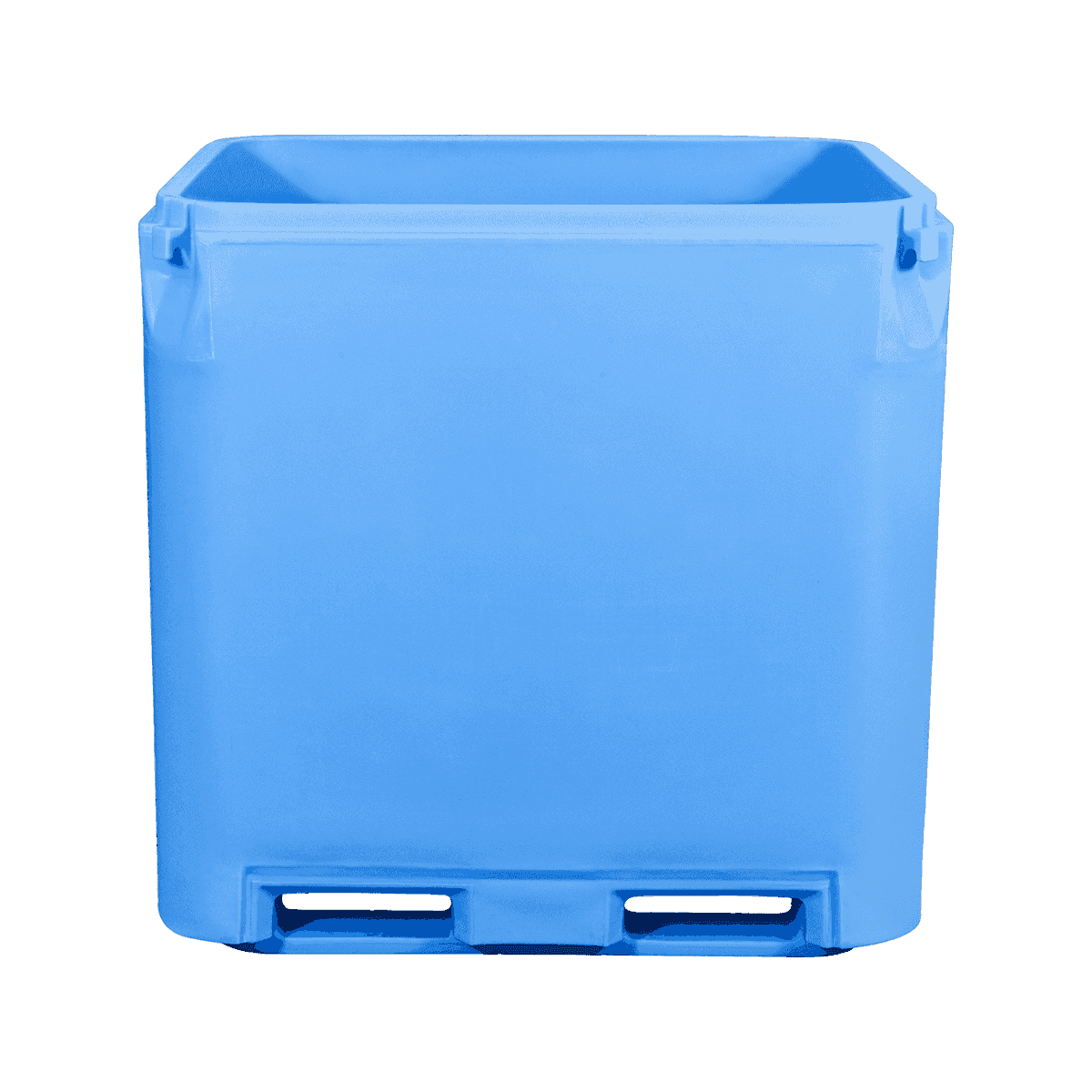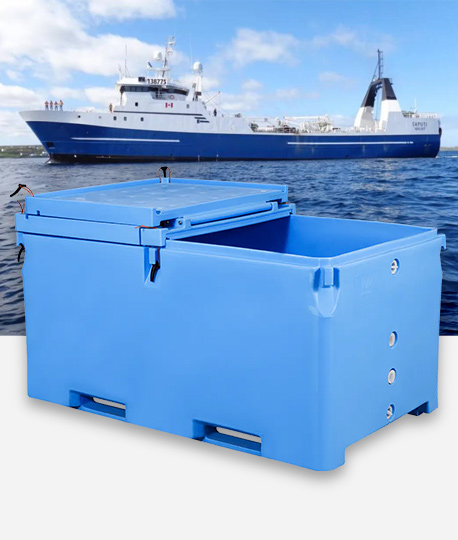Content
- 1 1. Enhanced Temperature Control
- 2 2. Reduced Risk of Product Damage
- 3 3. Cost-Effective Alternative to Refrigerated Transport
- 4 4. Flexibility and Versatility
- 5 5. Sustainability
- 6 6. Ease of Handling
- 7 7. Compliance with Industry Standards
- 8 8. Protection Against Environmental Factors
- 9 9. Improved Customer Satisfaction
- 10 10. Longer Shelf Life
Shipping temperature-sensitive goods, such as pharmaceuticals, food, and chemicals, requires careful attention to temperature control throughout the entire supply chain. Whether you’re managing the transportation of perishable food products, vaccines, or specialized chemicals, any deviation from optimal temperature ranges can lead to product spoilage, decreased quality, or regulatory non-compliance. One of the most effective solutions for this challenge is the use of insulated pallet containers.

1. Enhanced Temperature Control
Temperature control is paramount when shipping sensitive products. Insulated pallet containers are designed with materials that prevent heat transfer, ensuring that the internal temperature remains stable despite external environmental changes. This insulation barrier helps maintain the desired temperature for extended periods, whether you need to keep items cold or warm during transport.
For example, expanded polystyrene (EPS), polyurethane foam, and reflective insulation materials are commonly used in insulated pallet containers to provide excellent thermal protection. These materials can prevent temperature fluctuations for hours or even days, depending on the duration of transportation.
Example:
- In the food industry, refrigerated items like meats, dairy, and seafood must be kept below a certain temperature to prevent spoilage. Insulated pallet containers can maintain the proper temperature even when transported across long distances or during transit in hot weather conditions.
2. Reduced Risk of Product Damage
Temperature-sensitive goods are not only affected by temperature changes but can also suffer physical damage due to the lack of adequate protection. For instance, pharmaceutical products can lose efficacy if exposed to extreme temperatures, and food products may spoil, lose flavor, or develop harmful bacteria.
Insulated pallet containers mitigate this risk by providing a dual layer of protection:
- Thermal insulation to maintain the required temperature.
- Physical protection against impacts, moisture, and other environmental hazards.
This means that not only are your products kept at the right temperature, but they are also shielded from potential damage during transit, which is particularly crucial for high-value or sensitive items.
3. Cost-Effective Alternative to Refrigerated Transport
Refrigerated transportation is often necessary for certain products, but it comes with significant operational costs. Refrigerated trucks, containers, and equipment require high energy consumption, frequent maintenance, and more expensive transportation services. Insulated pallet containers offer a cost-effective alternative, as they do not require continuous power to maintain the temperature and can be used across multiple transport modes.
Cost Comparison:
| Transport Type | Initial Cost | Operational Costs | Maintenance | Suitability for Short Trips |
|---|---|---|---|---|
| Refrigerated Transport | High | Very High | High | Low |
| Insulated Pallet Containers | Low | Low | Low | High |
This table shows that insulated pallet containers offer significant cost savings, especially for shorter shipping distances or less frequent temperature-sensitive shipments. They reduce energy and maintenance costs, while still providing adequate protection for goods in transit.
4. Flexibility and Versatility
Insulated pallet containers are available in a wide range of sizes, making them adaptable to various shipping needs. Whether you’re shipping small batches or larger quantities, you can find the right container size to fit your cargo. These containers are also compatible with most standard pallet racking systems and shipping methods, making them versatile for different logistics environments.
Key Features of Insulated Pallet Containers:
- Stackable designs: Save storage space in warehouses and optimize shipping efficiency.
- Multiple temperature ranges: Some insulated containers can be designed to maintain different temperature zones, useful for products requiring specific climate conditions.
They can be used in trucks, cargo planes, or even rail, depending on your needs, and provide an easy way to optimize the transportation process.
5. Sustainability
In today’s logistics landscape, sustainability is increasingly important, not only for regulatory reasons but also as a way for companies to meet customer expectations for environmentally responsible practices. Many insulated pallet containers are made from recyclable materials like plastics and foams, which can be reused for multiple shipping cycles. This reduces the amount of waste generated from single-use packaging.
Moreover, insulated pallet containers help reduce the need for energy-intensive refrigerated transportation, cutting down on carbon emissions associated with fuel usage. By choosing insulated containers over refrigerated vehicles, you can significantly lower your environmental impact, making your logistics operations more sustainable.
Sustainability Benefits:
- Reduced carbon footprint.
- Less packaging waste.
- Reusable for multiple shipments.
6. Ease of Handling
Insulated pallet containers are typically designed to fit standard pallet sizes, which makes them easy to handle, load, and unload in warehouses and transport vehicles. They are compatible with pallet jacks, forklifts, and conveyor systems, which improves operational efficiency and reduces manual labor.
Because these containers are stackable, you can maximize cargo space, making it possible to transport more goods at once. This flexibility helps optimize your shipping processes and reduces overall shipping costs.
7. Compliance with Industry Standards
In regulated industries such as pharmaceuticals and food, strict standards govern the transport of temperature-sensitive goods. Insulated pallet containers can help ensure that your business remains compliant with regulations such as the Good Distribution Practice (GDP) for pharmaceuticals and HACCP for food safety.
These containers help you maintain the required temperature ranges during transit, making it easier to meet legal requirements and avoid costly fines, product recalls, or damaged reputation. Compliance with industry standards also ensures customer trust, which is essential for business success.
8. Protection Against Environmental Factors
In addition to temperature control, insulated pallet containers provide protection against other environmental factors such as humidity, dust, and UV exposure. Some products, especially sensitive chemicals and medical supplies, can degrade or become less effective if exposed to sunlight or moisture during transport.
The protective nature of insulated containers ensures that your goods are shielded from these environmental threats, helping maintain their integrity throughout the shipping process.
9. Improved Customer Satisfaction
One of the biggest advantages of using insulated pallet containers is the improvement in customer satisfaction. When products arrive in perfect condition—whether that’s fresh, unspoiled food or effective pharmaceuticals—it increases customer trust and satisfaction.
Maintaining product quality is crucial for industries like food and medicine, where compromised quality can not only lead to loss of sales but also legal issues. By investing in insulated pallet containers, you can ensure that your customers receive products that meet their expectations every time.
10. Longer Shelf Life
By maintaining the optimal temperature during transport, insulated pallet containers help extend the shelf life of temperature-sensitive goods. This is particularly important in industries like food and pharmaceuticals, where the freshness of products is directly tied to their effectiveness.
Example:
- Vaccines and Biopharmaceuticals: These products require strict temperature control to remain effective. Insulated pallet containers ensure that they maintain their potency during transit, which is crucial for public health and regulatory compliance.
By preventing spoilage or degradation, insulated pallet containers help reduce waste and improve overall supply chain efficiency.


 English
English Español
Español عربى
عربى 中文简体
中文简体
-4.png)
-4.png)
-2.png)

-2.png)
-2.png)




